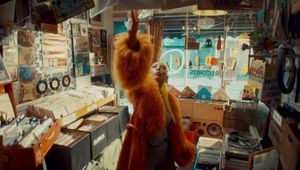
Producing Tomorrow’s Producers: Emmanuelle Le Chat on Having a Solution-Focused Approach

South African born Emmanuelle Le Chat has carved a remarkable path in the realm of creative production. Her journey began as a director's assistant, but her talent and dedication quickly propelled her into the dynamic world of freelance production.
Emmanuelle has collaborated with industry legends on some of the most exciting and challenging projects for brands such as Xbox, Squarespace, Instacart, Oculus, Apple, Sorare, Sports Direct, EE, SONY, Dulux, Adidas and Equinox to name a few. Each collaboration showcases her innovative spirit and unwavering commitment to excellence.
In 2021, Emmanuelle met Valentin Petit and they instantly became fond of each other’s views of the industry and desire to change it. Now as the MD of Ocurens UK, Emmanuelle continues to push creative boundaries alongside her partner Germain Robin, bringing her distinctive vision and expertise to every project.
LBB> What advice would you give to any aspiring producers or content creators hoping to make the jump into production?
Emmanuelle> Get your hands dirty as much as possible. You’re only as good as your network so don’t overlook a position/project that you think you might be above. You never know who you might end up meeting on set/pre-production who may give you your first big break. Meet people as much as possible, even if they’re not currently offering a job. Whatever you’re working on, give it your best shot and then a bit more – people will always notice that – even when things are crazy.
Finally, develop an appetite for risk and jump right in. This is an industry where we’re constantly learning on every project, no matter how much experience you think you may have. Embrace this when pursuing your first project – and use Google along the way.
LBB> What skills or emerging areas would you advise aspiring producers to learn about and educate themselves about?
Emmanuelle> If I could do it all again, I'd enrol in technical seminars on cameras and set equipment. Top producers, like my mentor and partner Germain Robin, know how to replace expensive gear with cost-effective alternatives, keeping budgets intact. Equipment is often the priciest part of a budget, but there's always a solution.
Young producers should also dive into VFX, CGI, and AI — key elements in today's projects. And never overlook post-production – understanding which is crucial. I can’t tell you how many seasoned producers I’ve met who don’t understand what happens after wrap – and don’t care to learn about it either!
LBB> What was the biggest lesson you learned when you were starting out in production - and why has that stayed with you?
Emmanuelle> While running is great for on-set experience, I recommend starting as an assistant to a producer or director. This role teaches multitasking, a crucial skill for producers, and offers a closer look at key production roles. Starting as a director's assistant accelerated my career and has allowed me to jump ahead as a young EP by exposing me to various producers' styles and mistakes. You learn more deeply than just being on set and get to go inside the brains of the integral roles of each project.
Another key lesson is to choose your battles wisely. When working with brands, you can't control everything, so focus your energy on what truly matters. Early on, I fought for everything, but experience taught me to pick my fights. For passion projects, fight harder; otherwise, know when to let go.
LBB> When it comes to broadening access to production and improving diversity and inclusion what are your team doing to address this? And why is it an important issue for the production community to address?
Emmanuelle> The fact that Valentin Petit and Germain Robin decided to put me in the position that I am in showcases Ocurens' commitment to diversity.
Film is traditionally much more supportive of male careers like many other industries, but we are championing female involvement as much as possible. Just yesterday, I saw a male director had made an ad for Tampax – this rubbed me the wrong way even though it looked great!
In many cases, the number of men being put forward for the job outnumbers the number of women, resulting in a man landing the project. Change starts with representation. This is why the minute I joined the company I signed two female directors – powerhouses Sasha Rainbow and Curry Tian.
We also recognise the need for more people of colour in the industry, especially in underrepresented roles like production as well as camera and AD teams. I'm proud my second UK hire was Bunmi Oyateru, a young creative from Nigeria. Starting as an intern, he quickly rose to producer and now leads Octane, supporting young, diverse directors.
As a South African, I’m passionate about creating content in Africa with African talent. Ocurens is starting a project featuring a Nigerian actress, inspired by her experience with endometriosis.
Creating content that represents diverse cultures and backgrounds is crucial. Perspective matters, and ensuring diversity behind the camera is just as important, if not more so, given the current landscape.
LBB> There are young people getting into production who maybe don’t see the line between professional production and the creator economy, and that may well also be the shape of things to come. What are your thoughts about that? Is there a tension between more formalised production and the ‘creator economy’ or do the two feed into each other?
Emmanuelle> Our industry must evolve, and we're at a crossroads where traditional production and the creative economy are at odds with each other. Our new digitally-led roster, Octane, is a response to this tension, boasting a line-up of directors who are comfortable moving between different content environments. I’m personally always inspired by the different range of content I see on social media, which only strengthens my view that the industry needs to be inspired by this content too.
We must adapt to changing audiences, connecting with Gen Z through social media in more authentic and exciting ways. There is data to show that TikTok viewers are looking and interacting with more high-quality content. Cinematic ‘vibes’ are working, and we can provide them.
LBB> If you compare your role to the role of executive producers when you first joined the industry, what do you think are the most striking or interesting changes (and what surprising things have stayed the same?)
Emmanuelle> In the UK, EPs with the longest-standing relationships inevitably dominate the market and this has not really changed. However, I've met amazing clients seeking something different. The shift is not necessarily in the producers that are coming through, but in the client mindset – where fresh faces and fresh ideas can often sway the pitch.
Another thing that is changing for the better is the EP's attitude towards projects. While some EPs I encountered as a freelance producer would win projects and then hand them off to producers, at Ocurens UK we follow the French model, where our EPs stay actively involved throughout the entire project.
LBB> When it comes to educating producers how does your agency like to approach this? (I know we’re always hearing about how much easier it is to educate or train oneself on tech etc, but what areas do you think producers can benefit from more directed or structured training?)
Emmanuelle> I’m a firm believer that the best way to learn is to be thrown into the fire. For example, we’ve just brought on a fantastic production assistant who in the first few days of joining the company was actively involved in producing a music video with us. Of course, she was surrounded by producers who had been working on the project for a while. It was the best way she could have learned how we operate.
I spend a lot of time with my production team and freelance producers, focusing on patience and understanding human psychology. For structured training, Germain and I emphasise process and organisation. Everyone knows their role, and over-communication is key. Our production bible is over 100 pages long, and new hires go through it thoroughly.
LBB> It seems that there’s an emphasis on speed and volume when it comes to content - but where is the space for up and coming producers to learn about (and learn to appreciate) craft?
Emmanuelle> We believe, especially through Octane, that quality content can be created quickly with good preparation and fixed, organised, processes. Intentionality is key, and it shows—even in just 10 seconds.
However, structure can stifle creativity. That's why I encourage producers to engage with films, theatre, books, and podcasts outside the office. We even have monthly cultural events. I seek team members who are always learning and staying inspired, which enriches our discussions and keeps our Ocurens world vibrant. The key is balance—taking the time to develop ideas creatively while meeting the demand for fast, high-quality content.
LBB> On the other side of the equation, what’s the key to retaining expertise and helping people who have been working in production for decades to develop new skills?
Emmanuelle> To retain expertise, stay actively involved in producing. Get out of your comfort zone. Take risks, no matter how much experience you’ve had. If you're only focusing on a birds eye view approach and not engaging in projects, you'll miss out on learning new things. Challenges, even if you fail, are essential to growth.
If you’ve not tried shooting on volumetric stages – maybe that's your next goal. AI is the next hot topic, learn how to dance with it. As technology and the industry evolve, we have to keep exercising that muscle in our brain vs relying on experts.
LBB> Clearly there is so much change, but what are the personality traits and skills that will always be in demand from producers?
Emmanuelle> There's certain qualities that we look for... in no particular order…
Organisation is crucial. Messy producers give me the “ick". If you need new processes to stay organised and efficient, explore them.
Be open-minded. Both to new tech and new ideas. Be open to input from anybody, no matter what their background. There's always a way to develop and evolve.
Stay creative. I look for producers with good taste and creative bones in their body. Directors need partners, not just producers.
Solutions not problems. Lastly, always come to me with solutions. Being solution-focused is essential and will never change.















